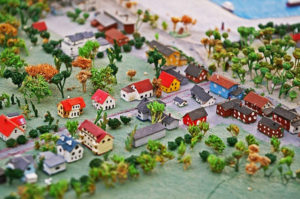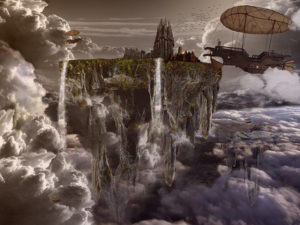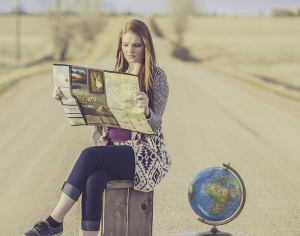Every story requires a setting. Even if you write about an astronaut adrift in the cosmos, you still have a setting. It can be extraordinary and invented out of your imagination completely, it could be a well-researched real-world location, or somewhere in between.
No matter what genre you’re writing, the setting has to matter. Sure, a contemporary drama could take place in Smithtown or Jonesville and no great changes would occur, but you can’t just forget about the world around your characters. Think about real life and the place you live, work, and play. It affects your life. Make or use a setting that affects your story.
Setting Options
Setting a story in an actual real-world location requires research. Lots of research sometimes. Imagine someone from that city or town reading your book and tossing it aside when you get something wrong.
Real, researched settings occur in contemporary and historical fiction. Stories based on real life need them in many cases.
How do you research real-life settings?
Well, Google is a great start. Most countries, states, and cities have websites of their own. Look at Google maps to get locations and a feel for the geography. Watch travel or slice-of-life videos on YouTube. Visit location-specific forums, social media pages, etc. Ask specific questions you cannot research the answers to.
If you need everything perfect from the speed limit on the main road through town to the name of the artist who created the statue on the library lawn, you have no option but to research extensively. However, if the details do not matter all that much to your story, consider creating a fictional real-world setting instead.
Many books — perhaps most contemporary fiction — are set in fictionalized real world settings. What does this mean?

Take a known location such as New York City, Idaho, or Namibia, and invent specific places within it. This makes creating a setting a lot less complicated and research-intensive without compromising the feel of the place you want your story to take place in.
You do not have to know that Pete's Deli is exactly two blocks from the Snowy Laundromat and a slightly rusty postal box stands outside near the light post. You do not have to scour Google Earth images and take precise measurements. It is perfectly acceptable to send your character to Quark's Game Shop around the corner from the Sakana Asian Fusion restaurant even if they are not really there in real life.
Stephen King invented Castle Rock and everything in it. J. K. Rowling created Godrick's Hollow. Agatha Christie's characters spent time in St. Mary Mead.
How Do You Invent a Fictional Real World Setting?
Pick a location that's really in the world. Chicago, Switzerland, a Mediterranean beach. This is the type of place your characters spend their time, live, or have to travel to for your story to work. Then, fill in the blanks. Maybe your character needs to try sushi for the first time with a date instead of grabbing a sandwich at the cafe that's really in a particular spot. That's really fine.
Some things to keep in mind:
1 -- Understand the feel, ambiance, or culture of a place. Don't make Chicago feel like the South of France just because it's more romantic.
2 -- Don't change anything residents would get mad about. Now, someone who loves Pete's Deli may grimace when you replace it with Quark's game shop, but that's not really a problem in the end. I'm talking about changing demographics, fictional gentrification, erasing quintessential landmarks, etc.
3 -- Get input from people who live there. If you don't know any, just search on YouTube or any geo-specific social media pages or community sites. How do people feel about their area? What outside impressions color it? You can learn background things from traffic patterns to popular events that will deepen your setting and add versimilitude.

When it comes to world-building, most people think about the creation of fantasy or science fiction worlds... totally fabricated and imaginary places. Since the writer gets to invent everything, many people think they can do this with no research or knowledge whatsoever. This is totally false.
Whether your world is on another planet, in a magical land far, far away, or merely another, odder version of the here and now, you need to create a world that makes sense.
It's not about existing outside of the proverbial box. It's about creating a totally new box and fitting everything into it.
How Do You Create a Fantasy or Science Fiction World?
First, think about the box your world fits into. This is the big picture stuff that makes existence function: physics, geography, climate. You might wonder why you have to go back this far or delve this deep to start world-building. I personally don't think you need massive world bibles or reams of notes about every detail. I do think you need to know how things work, however. If you don't, you risk having something that doesn't work, and that's not good for fiction.
Physics -- Most people default to reality-based physics. Gravity works. Stuff moves until something else stops it. Friction creates heat. All that stuff you learned in highschool science class. If this stuff doesn't work in the expected way in your world, you need to make sure your reader knows how it actually works. You also have to make everything that happens in your world matches your physics rules, whatever they are.
Geography -- Mountains usually turn into hills and then plains. Water sources start in the mountains and run downhill, getting wider as they go until they end up in lakes or oceans. Different types of rocks and ground do different things to the landscape. Does your world have tectonic plates? Volcanoes? Learn the basics about what these things do.
Climate -- Geography creates climate, for the most part. Unless you're working with weather magic or a totally alien 'box,' you'll have air and water currents that move temperature around and make things like storms and average daily temperatures happen. This affects everything from crops to how advanced your world's technology will be.
Sounds complex. Maybe too complex for your particular story. That's fine! You don't need to be a climatologist or track 1,000 years of continental drift to know if your hero completes their quest. You have to make your world make sense, however. If you have a river that runs uphill and then boils away in the Steamy Mountains, you have to know WHY that happens, because your reader will want to know, too.
Real World-Building
Where does your story take place? What location do you think your readers will love?
[caption id="attachment_517" align="alignright" width="300"] Your story location matters.[/caption]
Your story location matters.[/caption]
The answers to these two questions form the basis for your decision about what real-world spot to build your story in. The third most important question is about what location you either know a lot about or want to learn more about.
Genres Push for Certain Locations
Part of it comes down to genre, too. A contemporary cozy mystery book has to happen somewhere in the here and now. Cozies happen in small towns, not huge cities. Even country choice matters if you care about reader expectations (and you should if you want to sell books). An international crime thriller will not happen in Oakville, population 3000.
Some genres can happen anywhere, so you have to figure out what interests you and will intrigue your readers. Sometimes, location really doesn't matter much at all. That's fine, too. Set your family drama in Anytown, USA (just give it a better name).
Location: The Plate or the Spices
Using your story's location as the backdrop for the plot and character actions is fine. Chefs still care about what plate they choose to put their food on, but it's a lot less important than the ingredients. Using your story's location as spice works, too. Sprinkling interesting tidbits of verisimilitude all over the plot can add a lot of interest.
This probably isn't that helpful, is it?
In the end, if you have a real-world book, you need some type of real-world location. Recognize that where things happen affects how they happen, and you probably can't go wrong. Not sure? Try writing part of your story in different locations. I just did that in this Choose Your Setting blog post.
How do you sufficiently research a location to use it for the setting in your book?
First, decide how much detail you want or need. Do NOT get wrapped up in so much research that you forget to start writing.
Researching Real World Locations
Get Basic Information About the Place
-- Where is it on a map?
-- Population numbers and demographics
-- Government, main religions, economy
Explore the Culture and Feel
-- General values, manners, and customs
-- Daily life habits (afternoon siestas, all bars closed on Sunday, etc.)
-- What do outsiders think of the place, and does it make sense from the inside?
Transforming your imagination into a real world location isn't that hard. You only have to know some general information about the real place in order to make a believable fake place. Have you read any Stephen King? Did Castle Rock, Maine seem real? (At least the non-monster parts of it.) It's a small New England town that anyone can believe in.
Using a fabricated reality is the simplest way to create a setting. You do not even have to identify where it is in the world if you don't want to. Readers can guess based on some general clues. If you mention avoiding the highways on the weekend because everyone is heading down the shore, someone may guess New Jersey is your main setting. If you mention a day trip to the Eiffel Tower, it's pretty obvious your story takes place somewhere in France.
Choose a General Location
You can pick a country, state, or even city. You can also pick something less defined like "small southern town" or "big college town in the northeast" or "successful safari resort in central Africa." Either choose one you prefer and fit your story to it, or choose one your story already fits into. Interestingly enough, almost any story can fit into any setting with a few tweaks.
Research Enough to Get the Feel of the Place
A small southern town and an African safari resort feel exceptionally different. Well, they might have similar temperatures in the summer, but that's about it. You do not have to research every single detail to make the setting believable to readers, however. Just learn enough to get the right feel of things. You want readers to believe your characters are really there. Remember that some readers might have experienced these places, so add as much verisimilitude as possible.
How do you do this?
You should have some idea about how to research things on the internet. Pick a few small southern towns or safari parks and check out their websites, find videos from people who live there or have visited, and make a list of common features. A simple spray of Spanish moss in the trees or mosquito netting and acacia shrubs can give a clue about location.
Fantasy & Sci-Fi World-Building
When it comes to speculative fiction, you don't have a box to fit your story into. Thinking outside the box is fun, but it doesn't really work as well as you may like.
World building is about building your own box to fit everything inside. In order to build the box, you have to know how boxes... err, worlds... work.
First, take a look at the Fantasy & Sci-Fi Settings tab above. See how you have to start with physics, geography, and climate? These things define every other possibility in your world. Second, tackle civilization.
Fantasy and Science Fiction Civilizations
Answer these questions:
1 -- Where did the people (or whatever) come from?
- Evolved from primitive life forms
- "Seeded," broke off, or exiled from another civilization
- Crashed space ship
- Magic portal
2 -- Why did they settle there?
- Natural resources (really the most common reason people settle anywhere)
- Special resources like rare metals, oil, magic
- The gods/overlords told them to
3 -- How does their civilization survive?
- Resources present
- Trade routes established
- No one wanted to take over or kill them
4 -- What do they value as a society?
This is a bit trickier and more important for building your world and civilization
- Religion, magic power, special forces
- Military/physical power and control
- Nature and the environment
- Human rights
- Sex, money, drugs, and rock-n-roll
Values determine societal behaviors, accepted mindsets and attitudes, family structure, business deals, holidays, and pretty much everything else you can think of.
You find a lot more information about creating magic systems and science fiction tech in the Fiction Genres section of this website. Here I am just going to touch on the basics.
Adding magic or future (or imagined) technology to your speculative fiction story starts with understanding the world and how it functions. Of course, there is a huge difference between nano robots and genetic engineering and the ability to cast fireballs or levitate enchanted swords. In the end, however, both of these things focus on abilities.
Arthur C Clarke famously said, "Any sufficiently advanced technology is indistinguishable from magic." When speaking in the general sense, you can approach their inclusion in your world in the same way.
1 – How does magic or tech serve your characters? What can they do because of it that people in the real world can't?
2 – What limitations do magic or tech have? Making anything all-powerful in a story is generally boring because any conflict that arises has a simple solution.
3 – What is the cost for magical ability or using tech? Even the most powerful wizard should need to gather ingredients or recharge after casting difficult spells. Technological advancements need some sort of fuel or complex machinery to keep it running properly.
As with anything else in a quality fiction story, nothing can be too easy.
All that being said, remember that it is not essential to add a whole bunch of magic or complicated technology to fantasy and science fiction. Some fantasy worlds do not have magic at all, and some sci-fi only tiptoes into a more advanced future. Make unreal abilities suit your setting and story.
Naming planets, continents, countries, kingdoms, towns, and specific geological formations in fantasy and science fiction stories follows the same basic rules as naming places in made-up real-world settings. They also follow the rules of naming characters.
1 – Make sure your reader can easily read and pronounce them.
2 – Use names that makes sense in the world you have created.
3 – Avoid the same starting letter, rhymes, and other similarities that can cause confusion.
Out of those three rules, number two requires the most effort to get right.
Setting Names That Make Sense in Your World
Most geographical areas share naming conventions. For example, names of towns in a specific country will be from the language that they speak there. This will also extend to the names of their rivers, mountains, and roads. Naming conventions may also come from an organization responsible for categorizing planets or mapping newly discovered lands.
The names you choose for your setting may default to standard English descriptions in many cases. Naming a town in a wooded valley Oakdale can suit fantasy world as long as the next town over isn't called Hramht'lix. And intergalactic transport company may identify the first planetary stop as XJ-C34, but it might be quite odd to have their next port at planet Lewelliaria.
Follow some of the rules of the real world when you name things in your made-up world. People name places after locations, famous people, events in history, and geographic or geological details. Sticking with this basic plan and adding embellishments that make things interesting will help your setting makes sense to your readers.
